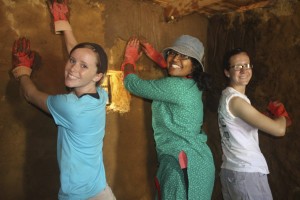Service Learning/Community Based Learning
One of the goals of Wisconsin Without Borders program is to build connections between researchers across departments in order to advance community and global engagement. Wisconsin Without Borders encourages faculty and students to traverse disciplinary and geographic boundaries, so that their specialized studies, whether they be in the arts, humanities, sciences or professional schools, are framed in a global context, and are complemented by an inter-disciplinary engagement that will allow them to be responsible global citizens and effective global leaders. In effort to facilitate this process we have compiled a variety of resources to encourage best practices in globally engaged learning and research.
Online Resources
globalsl.org amasses evidence-based tools and peer-reviewed research to advance best practices in global learning, community-university partnership, & sustainable development.
National Public Radio: Goats and Soda As ‘Voluntourism’ Explodes In Popularity, Who’s It Helping Most?
Association of American Colleges & Universities– Essential Learning Outcomes. Through its VALUE Initiative, AAC&U has developed a set of rubrics to assess learning outcomes related to assessing engaged learning.
Fair Trade Learning Rubric- Fostering a dialogue among stakeholders around essential dimensions of quality global partnerships.
Peer Reviewed Articles
Reflection-Linking Service and Learning
Partnerships of Reciprocal Exchange
Act-local-or-global-comparing-student-experiences
Can Americans Really be Global Citizens?
Topic: Researcher Positionality
Anne E Pezalla, Jonathan Pettigrew, and Michelle Miller-Day. (2012). Researching the researcher-as-instrument: an exercise in interviewer self-reflexivity. Qualitative Research, 1, 165-185.
Cervantes-Soon, C. (2014). The U.S.-Mexico border-crossing Chicana researcher: Theory in the flesh and the politics of identity in critical ethnography. The Journal of Latino – Latin American Studies, 6(2), 97-112.
Jacob, M. M. (2006). When a native “goes researcher”: Notes from the North American indigenous games. The American Behavioral Scientist, 50(4), 450-461.
Allen, L. (2010). Queer(y)ing the straight researcher: The relationship(?) between researcher identity and anti-normative knowledge. Feminism & Psychology, 20(2), 147-165.
Eduardo Bonilla-Silva and Tukufu Zuberi. 2008. Toward a Definition of White Logic White Methods In Tukufu Zuberi & Eduardo Bonilla-Silva (Eds.) White Logic, White Methods: Racism and Methodology (pp. 3-27). Lanham, MD: Rowman & Littlefield Publishers, Inc.
Carole Marks. 2008. Methodologically Eliminating Race and Racism. In In Tukufu Zuberi & Eduardo Bonilla-Silva (Eds.) White Logic, White Methods: Racism and Methodology (pp. 47-62). Lanham, MD: Rowman & Littlefield Publishers, Inc.
Eve Tuck & K. Wayne Yang. 2013. R-Words: Refusing Research. In Django Paris & Maisha T. Winn (Eds.). 2013. Humanizing Research (pp. 223-248). Sage Publications.
Topic: Humanizing Research
David E. Kirkland. 2013. Why I Study Culture, and Why It Matters: Humanizing Ethnographies in Social Science Research. In Django Paris & Maisha T. Winn (Eds.). Humanizing Research: Decolonizing Qualitative Inquiry with Youth and Communities (pp. 179-200). Los Angeles: SAGE Publications, Inc.
Django Paris. 2011. ‘A friend who understand fully’: notes on humanizing research in a multiethnic youth community.International Journal of Qualitative Studies in Education, 24(2), 137-149.
James R. Rogers & Elizabeth J. Russell. 2014. A framework for bridging cultural barriers in suicide risk assessment: The role of compatibility heuritistcs. The Counseling Psychologist 42(1), 55-72.
Topic: Data Ownership
Patricia Mariella, Eddie Brown, Michael Carter, Vanessa Verri, 2009. “Tribally-Driven Participatory Research: State of the practice and potential strategies for the future.” Journal Of Health Disparities Research And Practice, 3(2), 41-58.
Morton, D.J., Proudfit, J., Calac, D., Portillo, M., Lofton-Fitzsimmons, G., Molina, T., Flores, R., Lawson-Risso, B., and Majel-McCauley, R. 2013 “Creating Research Capacity Through a Tribally Based Institutional Review Board.” American Journal Of Public Health. 103(12):2160-2164.
Topic: Decolonized Methods
Tuhiwai Smith, Linda (2012). Decolonizing Methodologies: Research and Indigenous Peoples. 2nd ed. NY: Zed Books.
Dyrness, Andrea (2011). Mothers United: An Immigrant Struggle for Socially Just Education. Minneapolis, MN: University of Minnesota Press.
